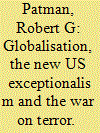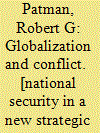| Srl | Item |
| 1 |
ID:
074907


|
|
|
|
|
| Publication |
2006.
|
| Summary/Abstract |
This article focuses on the tensions between a new exclusive US exceptionalism after 9/11 and a globalised security environment. The terrorist attacks in Washington and New York revealed that even the world's only superpower is vulnerable to the type of transnational violence that had blighted other countries during the post-cold war era. Yet these events, at least in the short term, have served to intensify the ‘distinctive American internationalism’ of the Bush administration. This trend culminated in the USA bypassing the authority of the UN Security Council and leading an invasion of Iraq in March 2003. Nevertheless, there are growing signs that this new American exceptionalism has become a serious impediment to effectively prosecuting the war on terror. In the era of globalisation it is the support of other nations and multilateral institutions that offers the best hope of ensuring that the USA lives in a more secure world. Without moving to a more inclusive form of exceptionalism, Washington will struggle to sustain the level of international support that it needs to prevail in the current struggle against terrorism.
|
|
|
|
|
|
|
|
|
|
|
|
|
|
|
|
| 2 |
ID:
073301


|
|
|
|
|
| Publication |
London, Routledge, 2006.
|
| Description |
xii, 266p.
|
| Standard Number |
0415359880
|
|
|
|
|
|
|
|
|
|
|
|
Copies: C:1/I:0,R:0,Q:0
Circulation
| Accession# | Call# | Current Location | Status | Policy | Location |
| 051579 | 327.73009051/PAT 051579 | Main | On Shelf | General | |
|
|
|
|
| 3 |
ID:
147581


|
|
|
|
|
| Summary/Abstract |
extraordinary scope of the National Security Agency’s surveillance capabilities and the facilitating role of the Five Eyes alliance converged with increasing public concerns about the Government Communications Security Bureau Amendment and Related Legislation Bill in 2013. This generated an intense and sustained debate in the country about surveillance policy. It was a debate in which Prime Minister John Key has featured prominently. While apparently unable to clearly refute Snowden’s claims concerning mass surveillance in New Zealand, Key’s vigorous public interventions helped counter the short-term political and diplomatic fallout. However, the long-term impact of public concerns over the surveillance policies of the Key government may be much harder to predict in what is an intimate democracy, and the prospect of substantial political blowback cannot be ruled out.
|
|
|
|
|
|
|
|
|
|
|
|
|
|
|
|
| 4 |
ID:
086408


|
|
|
|
|
| Publication |
2009.
|
| Summary/Abstract |
The US national security state was fashioned at the beginning of the Cold War to contain the global threat of the rival superpower, the Soviet Union. However, this security framework did not wither away with the end of the Cold War and the disintegration of the USSR. The events of September 11 starkly exposed the limitations of a state-centric approach to international security in a globalizing world. But the Bush administration falsely assumed that the traumatic events of 9/11 came out of a clear blue sky, and that a rejuvenated national security state would eventually overwhelm the 'new' threat of terrorism. The dangers of persisting in this direction were shown by the US-led invasion of Iraq. Far from closing the gap between the US approach to security and the operation environment of a post-Cold War world, Bush's war on terror undermined the international reputation of the US and presented the American taxpayer with a huge and probably unsustainable burden. All this highlighted the need for a more multilateral direction in US security policy in the post-Bush era. Such an approach would not only correspond better to the realities of today's interconnected world, but also serve as a buffer against the extension of the power of government that had been witnessed in America during the Bush years.
|
|
|
|
|
|
|
|
|
|
|
|
|
|
|
|
| 5 |
ID:
048354


|
|
|
|
|
| Publication |
Houndmills, Macmillam press, 1999.
|
| Description |
xv, 290p.
|
| Standard Number |
033373226X
|
|
|
|
|
|
|
|
|
|
|
|
Copies: C:1/I:0,R:0,Q:0
Circulation
| Accession# | Call# | Current Location | Status | Policy | Location |
| 041615 | 355.03/PAT 041615 | Main | On Shelf | General | |
|
|
|
|
| 6 |
ID:
082675


|
|
|
|
|
| Publication |
2008.
|
| Summary/Abstract |
This article explores the tension between the role of religious language as a domestic legitimising device for the Bush administration and its adverse impact on Washington's foreign policy image. It argues that President Bush's political fundamentalism after 9/11 has become a major obstacle to effectively addressing the challenge of international terrorism. It examines the interface between religion and the traditional idea of US exceptionalism, considers the political rise of the Christian right in American politics since the 1970s, shows how 9/11 served as a transformative event in the emergence of political fundamentalism in the White House and explores the impact of the construction of President Bush's 'war on terror' policies on the domestic and international environments. The conclusion acknowledges a substantial gulf between the domestic and international responses to President Bush's brand of political fundamentalism, but concedes that these differences have been narrowing over time.
|
|
|
|
|
|
|
|
|
|
|
|
|
|
|
|